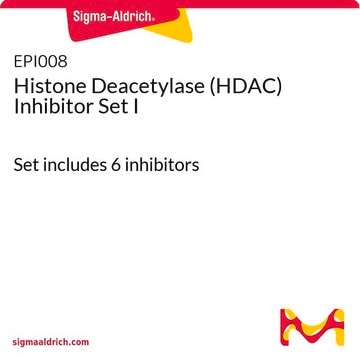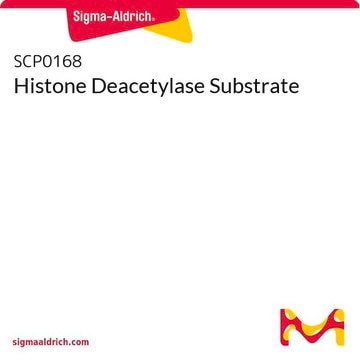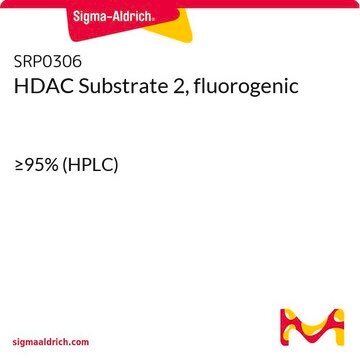EPI007
Histone Deacetylase 8 (HDAC8) Inhibitor Screening Kit
100 assays in 96 well plates
Iniciar sesiónpara Ver la Fijación de precios por contrato y de la organización
About This Item
Productos recomendados
usage
100 assays in 96 well plates
NCBI accession no.
shipped in
wet ice
storage temp.
−20°C
Gene Information
human ... HDAC8(55869)
mouse ... HDAC8(70315)
General description
Histone deacetylases (HDACs) are a large family of enzymes that remove acetyl groups from histone proteins. Site specific histone acetylation and deacetylation have been shown to activate or repress eukaryotic gene transcription, respectively, and as a consequence, HDACs play a crucial role in mammalian development and disease. HDACs are involved in important biological activities, such as cell differentiation, proliferation, apoptosis, and senescence.
With Sigma′s HDAC8 Inhibitor Screening Kit, HDAC8 Enzyme acts with the supplied Developer to deacetylate and then cleave the HDAC8 Substrate (R-H-K(Ac)-K(Ac)-AFC). This activity releases the quenched fluorescent group, AFC, which can be detected at Em/Ex=380/500 nm. In the presence of a HDAC8 inhibitor, AFC is not released and its fluorescence remains quenched. The kit provides a rapid, simple, sensitive, and reliable test, suitable for either individual tests or high throughput screening of HDAC8 inhibitors. Trichostatin A (TSA) is included as a control inhibitor to compare with the efficacy of test inhibitors.
With Sigma′s HDAC8 Inhibitor Screening Kit, HDAC8 Enzyme acts with the supplied Developer to deacetylate and then cleave the HDAC8 Substrate (R-H-K(Ac)-K(Ac)-AFC). This activity releases the quenched fluorescent group, AFC, which can be detected at Em/Ex=380/500 nm. In the presence of a HDAC8 inhibitor, AFC is not released and its fluorescence remains quenched. The kit provides a rapid, simple, sensitive, and reliable test, suitable for either individual tests or high throughput screening of HDAC8 inhibitors. Trichostatin A (TSA) is included as a control inhibitor to compare with the efficacy of test inhibitors.
Features and Benefits
- Simple, sensitive, and reliable assay
- Simple procedure; takes ~60 min
- Utilizes fluorometric methods
- Sample type: candidate HDAC8 inhibitors
- Suitable for screening HDAC8 inhibitors
- Suitable for individual tests or high throughput assays
- Convenient 96-well microplate format
Related product
Referencia del producto
Descripción
Precios
Storage Class
10 - Combustible liquids
wgk_germany
WGK 3
flash_point_f
188.6 °F - closed cup
flash_point_c
87 °C - closed cup
Certificados de análisis (COA)
Busque Certificados de análisis (COA) introduciendo el número de lote del producto. Los números de lote se encuentran en la etiqueta del producto después de las palabras «Lot» o «Batch»
¿Ya tiene este producto?
Encuentre la documentación para los productos que ha comprado recientemente en la Biblioteca de documentos.
Yong Wang et al.
Circulation research, 114(6), 957-965 (2014-01-31)
Our previous study has shown that yes-associated protein (YAP) plays a crucial role in the phenotypic modulation of vascular smooth muscle cells (SMCs) in response to arterial injury. However, the role of YAP in vascular SMC development is unknown. The
Ji Heon Noh et al.
Cancer research, 74(6), 1728-1738 (2014-01-23)
Aberrant regulation of histone deacetylase 2 (HDAC2) contributes to malignant progression in various cancers, but the underlying mechanism leading to the activation of oncogenic HDAC2 remains unknown. In this study, we show that HDAC2 expression is upregulated in a large
Bihua Bie et al.
Nature neuroscience, 17(2), 223-231 (2014-01-21)
Amyloid-induced microglial activation and neuroinflammation impair central synapses and memory function, although the mechanism remains unclear. Neuroligin 1 (NLGN1), a postsynaptic protein found in central excitatory synapses, governs excitatory synaptic efficacy and plasticity in the brain. Here we found, in
Astrid M Kral et al.
Biochemistry, 53(4), 725-734 (2014-01-24)
Histone deacetylases (HDACs) play diverse roles in many diseases including cancer, sarcopenia, and Alzheimer's. Different isoforms of HDACs appear to play disparate roles in the cell and are associated with specific diseases; as such, a substantial effort has been made
Hai-Ying Zhu et al.
Biochemical and biophysical research communications, 444(4), 638-643 (2014-02-05)
Interspecies somatic cell nuclear transfer (iSCNT) is a promising method to clone endangered animals from which oocytes are difficult to obtain. Monomeric red fluorescent protein 1 (mRFP1) is an excellent selection marker for transgenically modified cloned embryos during somatic cell
Nuestro equipo de científicos tiene experiencia en todas las áreas de investigación: Ciencias de la vida, Ciencia de los materiales, Síntesis química, Cromatografía, Analítica y muchas otras.
Póngase en contacto con el Servicio técnico







